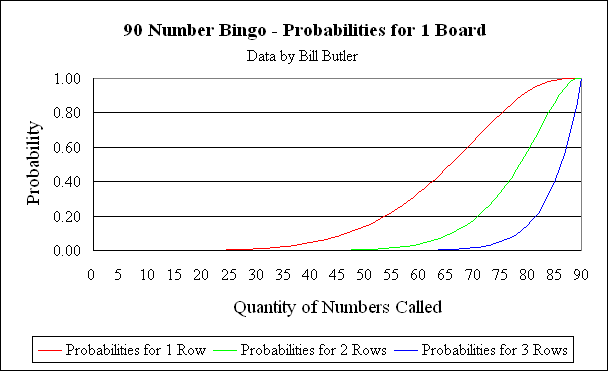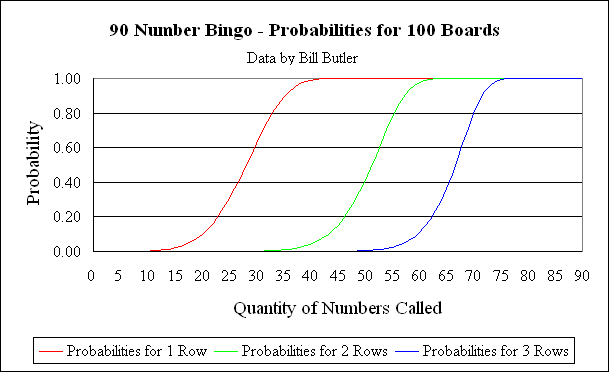
Durango Bill's
90 Number Bingo - Probabilities and Statistical Analysis
Bingo 90 - Probability Analysis and Graphs for the 3-row, 9-column version
Statistical Probabilities and Data for a Single Board and 100 Boards
There is a variation of the 75-Number Bingo game that randomly picks numbers from a set of 90 numbers. In this variation a “Bingo” consists of filling 1, 2, or 3 rows. A typical Bingo board for this 90 number game has 3 rows and 9 columns and could look like the following:
1
* 21 * *
51 61 * 81
* 19 22 37 44 * * 72 *
10 * 30 * * 60 70 * 90
* 19 22 37 44 * * 72 *
10 * 30 * * 60 70 * 90
The 12 stars are free spaces while there are 15 random numbers ranging from 1 to 90. (Some versions of the game have blanks instead of stars. Also, for the calculations given here, each row must have 5 numbers and 4 stars.) The stars and numbers may be arranged randomly across each row. As numbers are called, a marker is used to cover a space if the called number matches one of the numbers on your board. If you completely fill any row with a combination of markers and free spaces (or multiple rows depending on the “win” definition), you have a Bingo.

The red line in the above graph shows the probability that a single board will score a 1-row Bingo on or before the “Nth” number is called. The green line shows the probability that a single board will score a 2-row Bingo on or before the “Nth” number is called. Finally the blue line shows similar data to fill all three rows (fill all spaces) for a single board. Exact statistical numbers are given in the table below.

The above graph shows probabilities if there are 100 boards in play for a 90-number game. (Calculations assume that all boards are randomly independent.) The red line shows the probability that at least one board will fill a row on or before the “Nth” number is called. The green line shows the probability that at least one board will fill 2 rows on or before the “Nth” number is called. Finally, the blue line shows the probability that at least one board will fill all three rows on or before the “Nth” number is called.
The table below gives the statistics for the above graphs. The first column shows how many numbers have been called. The second column shows the probability that a single board will fill one row on or before a given quantity of numbers have been called. The third column shows the probability that at least 1 board out of 100 will fill a row on or before a given quantity of numbers have been called. Columns 4 - 7 show similar paired probabilities for 2 and 3 row fills.
For example, by the time 50 numbers have been called, there is a 0.139290 probability that a single board will have filled 1 row. If 100 boards are in play, then there is a 0.411553 probability that at least 1 of these boards has filled 2 rows.
Quantity Cumulative Cumulative Cumulative Cumulative Cumulative Cumulative
of Bingo Prob. of Prob. of Prob. of Prob. of Prob. of Prob. of
Numbers 1 row fill 1 row fill 2 row fill 2 row fill 3 row fill 3 row fill
Picked 1 Board 100 Boards 1 Board 100 Boards 1 Board 100 Boards
--------------------------------------------------------------------------------
5 0.000000 0.000007
6 0.000000 0.000041
7 0.000001 0.000143
8 0.000004 0.000382
9 0.000009 0.000860
10 0.000017 0.001719 0.000000 0.000000
11 0.000032 0.003149 0.000000 0.000000
12 0.000054 0.005392 0.000000 0.000000
13 0.000088 0.008747 0.000000 0.000000
14 0.000137 0.013574 0.000000 0.000000
15 0.000205 0.020292 0.000000 0.000000 0.000000 0.000000
16 0.000298 0.029380 0.000000 0.000000 0.000000 0.000000
17 0.000422 0.041368 0.000000 0.000001 0.000000 0.000000
18 0.000585 0.056822 0.000000 0.000002 0.000000 0.000000
19 0.000794 0.076330 0.000000 0.000005 0.000000 0.000000
20 0.001058 0.100465 0.000000 0.000010 0.000000 0.000000
21 0.001389 0.129756 0.000000 0.000018 0.000000 0.000000
22 0.001797 0.164634 0.000000 0.000034 0.000000 0.000000
23 0.002296 0.205382 0.000001 0.000060 0.000000 0.000000
24 0.002900 0.252075 0.000001 0.000103 0.000000 0.000000
25 0.003625 0.304522 0.000002 0.000171 0.000000 0.000000
26 0.004487 0.362212 0.000003 0.000278 0.000000 0.000000
27 0.005506 0.424287 0.000004 0.000442 0.000000 0.000000
28 0.006702 0.489534 0.000007 0.000688 0.000000 0.000000
29 0.008096 0.556418 0.000011 0.001050 0.000000 0.000000
30 0.009712 0.623156 0.000016 0.001574 0.000000 0.000000
31 0.011575 0.687842 0.000023 0.002322 0.000000 0.000001
32 0.013712 0.748600 0.000034 0.003375 0.000000 0.000001
33 0.016152 0.803757 0.000048 0.004838 0.000000 0.000002
34 0.018925 0.852017 0.000069 0.006845 0.000000 0.000004
35 0.022063 0.892583 0.000096 0.009567 0.000000 0.000007
36 0.025600 0.925234 0.000133 0.013218 0.000000 0.000012
37 0.029572 0.950303 0.000182 0.018063 0.000000 0.000020
38 0.034015 0.968593 0.000247 0.024423 0.000000 0.000034
39 0.038969 0.981217 0.000332 0.032689 0.000001 0.000055
40 0.044472 0.989424 0.000443 0.043320 0.000001 0.000088
41 0.050568 0.994423 0.000585 0.056852 0.000001 0.000139
42 0.057298 0.997262 0.000767 0.073891 0.000002 0.000215
43 0.064705 0.998756 0.000999 0.095105 0.000003 0.000331
44 0.072835 0.999480 0.001291 0.121202 0.000005 0.000502
45 0.081732 0.999802 0.001658 0.152895 0.000008 0.000753
46 0.091442 0.999932 0.002115 0.190841 0.000011 0.001117
47 0.102008 0.999979 0.002683 0.235570 0.000016 0.001640
48 0.113477 0.999994 0.003382 0.287378 0.000024 0.002384
49 0.125890 0.999999 0.004241 0.346215 0.000034 0.003435
50 0.139290 1.000000 0.005289 0.411553 0.000049 0.004903
51 0.153717 1.000000 0.006562 0.482280 0.000070 0.006939
52 0.169208 1.000000 0.008101 0.556632 0.000098 0.009738
53 0.185797 1.000000 0.009953 0.632214 0.000136 0.013557
54 0.203514 1.000000 0.012172 0.706136 0.000189 0.018722
55 0.222383 1.000000 0.014819 0.775295 0.000260 0.025653
56 0.242425 1.000000 0.017963 0.836777 0.000355 0.034874
57 0.263650 1.000000 0.021683 0.888319 0.000482 0.047036
58 0.286064 1.000000 0.026064 0.928711 0.000650 0.062923
59 0.309661 1.000000 0.031206 0.958010 0.000871 0.083464
60 0.334429 1.000000 0.037215 0.977461 0.001162 0.109723
61 0.360342 1.000000 0.044210 0.989129 0.001540 0.142857
62 0.387361 1.000000 0.052321 0.995364 0.002032 0.184046
63 0.415436 1.000000 0.061690 0.998283 0.002667 0.234361
64 0.444501 1.000000 0.072468 0.999459 0.003483 0.294562
65 0.474475 1.000000 0.084821 0.999859 0.004528 0.364825
66 0.505258 1.000000 0.098921 0.999970 0.005860 0.444415
67 0.536734 1.000000 0.114951 0.999995 0.007551 0.531358
68 0.568769 1.000000 0.133100 0.999999 0.009687 0.622229
69 0.601207 1.000000 0.153562 1.000000 0.012378 0.712222
70 0.633874 1.000000 0.176530 1.000000 0.015754 0.795661
71 0.666577 1.000000 0.202194 1.000000 0.019974 0.867032
72 0.699102 1.000000 0.230737 1.000000 0.025231 0.922342
73 0.731219 1.000000 0.262321 1.000000 0.031756 0.960327
74 0.762678 1.000000 0.297086 1.000000 0.039829 0.982827
75 0.793217 1.000000 0.335132 1.000000 0.049787 0.993945
76 0.822562 1.000000 0.376511 1.000000 0.062029 0.998344
77 0.850434 1.000000 0.421209 1.000000 0.077036 0.999670
78 0.876551 1.000000 0.469125 1.000000 0.095378 0.999956
79 0.900639 1.000000 0.520051 1.000000 0.117733 0.999996
80 0.922438 1.000000 0.573644 1.000000 0.144902 1.000000
81 0.941718 1.000000 0.629392 1.000000 0.177834 1.000000
82 0.958285 1.000000 0.686579 1.000000 0.217647 1.000000
83 0.972006 1.000000 0.744239 1.000000 0.265658 1.000000
84 0.982822 1.000000 0.801108 1.000000 0.323410 1.000000
85 0.990776 1.000000 0.855561 1.000000 0.392712 1.000000
86 0.996037 1.000000 0.905545 1.000000 0.475679 1.000000
87 0.998936 1.000000 0.948502 1.000000 0.574779 1.000000
88 1.000000 1.000000 0.981273 1.000000 0.692884 1.000000
89 1.000000 1.000000 1.000000 1.000000 0.833333 1.000000
90 1.000000 1.000000 1.000000 1.000000 1.000000 1.000000
How to
Calculate the probabilities for 90 Number (3 row) Bingo
The free spaces on the board do not play a part in the probability calculations. Thus calculations use a 3 row by 5 column board.
The probability of any “1-Board” entry in the above table is the sum of the probabilities of all the various ways that the event in question can happen. As an example, we will show how to calculate the probability that a single board can fill at least one row by the time 40 numbers have been called.
The probability that a single board has filled at least one row by the time 40 numbers have been called is equal to the sum of:
The probability that exactly 5 of the 40 called numbers are on the board times the probability that these 5 numbers complete a row.
Plus
The probability that exactly 6 of the 40 called numbers are on the board times the probability that these 6 numbers complete a row.
Plus
The probability that exactly 7 of the 40 called numbers are on the board times the probability that these 7 numbers complete a row.
Etc.
The probability that exactly 15 of the 40 called numbers are on the board times the probability that these 15 numbers complete a row.
The first part of any of the, “exactly N of the 40 called numbers…” is:
Prob. = COMBIN(15, N) * COMBIN(90-15, 40-N) / COMBIN(90, 40)
If we are calculating for 6 on the board this becomes:
Prob. = COMBIN(15, 6) * COMBIN(75, 34) / COMBIN(90, 40) = 0.209994
For the second half of this calculation we have to calculate the following table which shows how many times a bingo exists given that “N” hits are randomly placed on the board.
Number Number Number of Number of Number of
Hits Combin. 1-row fills 2-row fills 3-row fills
0 1 0 0 0
1 15 0 0 0
2 105 0 0 0
3 455 0 0 0
4 1,365 0 0 0
5 3,003 3 0 0
6 5,005 30 0 0
7 6,435 135 0 0
8 6,435 360 0 0
9 5,005 630 0 0
10 3,003 753 3 0
11 1,365 615 15 0
12 455 330 30 0
13 105 105 30 0
14 15 15 15 0
15 1 1 1 1
The table itself can be calculated by either some convoluted combinatorics or as part of a computer program that generates all combinations and counts the results. If we look at row 6 we see that there are 5005 possible ways that you can hit 6 of the 15 numbers on the Bingo board. 30 of these combinations will produce a 1 row fill. Thus if you randomly mark 6 of the 15 numbers on the board, there will be a 30 / 5005 = 0.005994 chance that you will have a 1 row Bingo.
Finally, we multiply our two partial results together to find that if 40 numbers have been called in a game, and if exactly 6 of these hit on your Bingo card, then there is a 0.209994 * 0.005994 = 0.0012587 probability that this particular combination will result in a Bingo.
Next, repeat all the above calculations for 5, 7, 8, 9, 10, 11, 12, 13, 14, and 15 hits on the board. Add all of these partial amounts together. The result will be the 0.044472 value shown in the table as the probability that a single board will have a Bingo by the time 40 numbers have been called.
Next, call in your handy dandy computer program for all these calculations.
The 100-board probabilities are easy once you have the single board result. For example, the probability that at least 1 of the 100 boards will have a 1 row bingo after 40 calls is: 1-(1-0.044472)^100 = 0.989424.
Return to the main Bingo page
Web page generated via Sea Monkey's Composer
within a Linux Cinnamon Mint 18 operating system.
(Goodbye Microsoft)